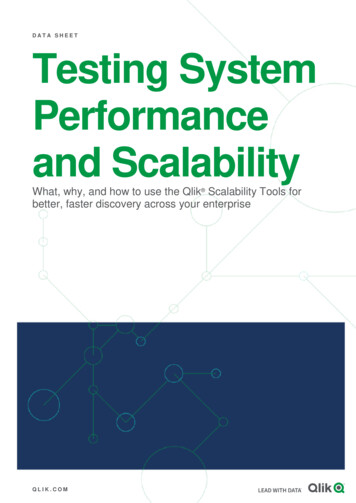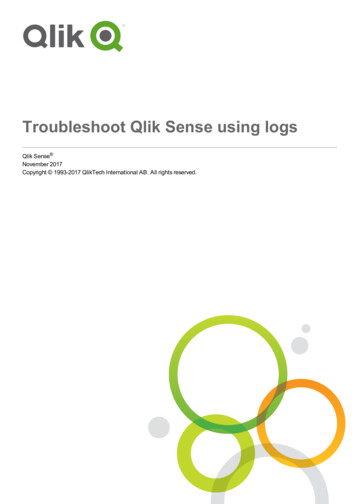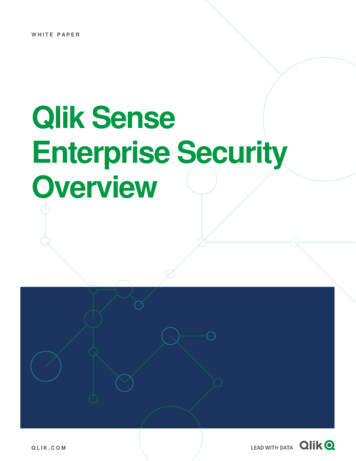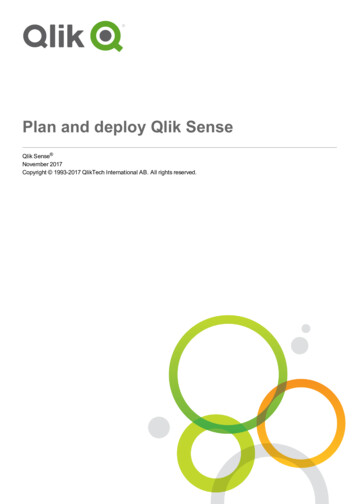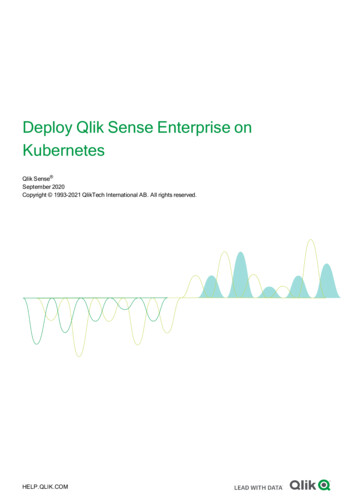
Transcription
A Financial Education Program from College In ColoradoInvest in Yourself:MAKING SENSEOF MONEYHIGH SCHOOL EDITION
INTRODUCTIONCongratulations! You have just picked up a valuabletool for creating your own financial success.Managing money is a skill that takes time and effort to develop and is importantwhether you have a small amount to begin with or a large amount. The excitingthing about learning how to manage your money is that YOU CAN DO IT!It’s true—you can learn how to change your money mindset, develop a savingshabit, create a spending plan, build a positive credit history, choose investmentsthat match your risk tolerance, protect your personal identity and pay for college.All of these money management skills will help you today, tomorrow and far intothe future.As a high school student, you may be more concerned about short-term goals,and it’s possible that you can rely on other people for most of your expenses. Asa result, you may wonder what all the “noise” is about when it comes to moneymanagement and financial education. The reality is, in a short time you may bethinking about being on your own. It’s not too soon to be thinking about how tomanage your personal finances so you can reach your goals.So, take a deep breath and focus just on YOU. This guide is all about you andyour personal financial success. As you begin, you’ll notice that each section hasthe same resources to help you on your way.Financial Cents – gives a sense of what you’ll be learning in each section.Good Questions – offer an opportunity to reflect on important issues. Thesequestions are also good conversation starters to use with your friends and family.Important Exercises – provide practical application of the ideas discussed.Lessons Learned – recap the important points.3PS YC HO LO GY OF MO N EY7I N C O ME13M O N E Y M A N A G E ME N T21SPENDI NG27S AV I N G & I N V E S T I N G35CR E DIT41I D E N T I T Y T HE FT45PAY I N G F O R C O L L E G E49G L O S S A RYSo What? Now What? – poses the tough questions that only YOU can answeron your way to financial success.Terms to Know – lists impor tant words that will be featured in the section anddefined in the glossary.Resources – are just the tip of the iceberg. We offer a few resources here andmany others online to learn more and in some cases, gain in-depth informationabout a topic.One last thing—if you have Internet access, you’ll want to visit Money 101at CICMoney101.org. The material presented here is just the tip of theiceberg. The website offers even more information, online activities, and usefultools.Ready to get started?2
PSYCHOLOGY OF MONEYT E R M S TO K N O WMaking payments, paying for college, and savingor investing in your future can be difficult.Changing financial habits that may be causingfinancial difficulties can be even more challenging.BudgetCognitive Behavioral TherapyIrrational BeliefsRational BeliefsLet’s begin with the belief that it IS possible toprevent financial meltdowns and take greater control over your financial lifeby learning about both the head and hear t matters of your finances—howfinances work (head) and how you feel about money (hear t). Once youdiscover how to control your feelings, you can also control your money.One of the first steps in taking control is realizing what is in your control. Your beliefs (thoughts, feelings, opinions,expectations) and your behaviors (spending, saving, investing) are all within your control. We’ve developed thisprogram around the work of the famous psychologist, Dr. Alber t Ellis. Dr. Ellis’s theor y, cognitive behavioral therapy,says that other people, situations and events aren’t responsible for your mood and behavior—you are.Here is an example: You feel hopeless (belief) because you areliving from paycheck to paycheck (behavior). To compensate, youbegin to use your credit card (behavior) because you think (belief)you deserve the good things in life even if your pay check isn’t bigenough to get them. Every one of these beliefs and behaviors arewithin YOUR control. We’re going to focus on strategies to helpyou change those things so that you can grab hold of your dreams.Of course, the choice to do so is yours!GOOD QUESTION :Are our thoughts and feelingsabout money really thatimportant in personal finance?3
Self-worth and personal financesSo, what’s your money history? Your money history directly affects your relationship with money. Everyone’s history is different—even within the same family! Your money history is based on memories you have regarding having money or not, allowance, savings,and gifts. It includes your family’s financial circumstances and traditions around money and work. Your money history is shaped bymoney messages from your friends, community, and society in general. It is part of what shapes your beliefs about money and yourrelationship with money.How you feel about yourself will affect how you handle your money.For example, if you don’t believe you can be successful (you have low self-worth), you probably don’t believe you’llbe able to be financially successful. When that’s your belief, you may not choose to do those things that help you befinancially successful such as save, invest, or seek the advice of a financial professional. You may not go to collegebecause you can’t imagine yourself being successful there. But, the reality is that many people have been successfulattending college even if they didn’t do so well in their earlier educations.Part of our money history may include a recurring sound bite—some of usmight refer to that sound bite as an adage, a motto, a mantra, a slogan, a phrase,or just a wise saying. For example, did you ever hear anyone say, “Money doesn’tgrow on trees!” or “You can’t take it with you”?GOOD QUESTION:Is your money history helping you or holdingyou back?IMPORTANT EXERCISE: Money MindsetDirections:Your money mindset is your “core” belief or feeling about money. It is that sound bite that plays over and overin your head – sometimes you don’t even consciously hear it! Your money mindset influences how you behave with money.There are many familiar statements about money. As you read each statement below, indicate how close it is to yourmindset or belief about money. Relax—there are no right or wrong answers!RATING SCALEThe statement is:3 Very similar to my beliefs/feelings about money2 Somewhat similar to my beliefs/feelings about money1 Not related at all to my beliefs/feelings about moneyNow, take a moment to think aboutyou.What is your money mindset?Consider your core beliefs and feelingsabout earning, savings, spending,investment, and credit and write yourown money statement(s):Money doesn’t buy happiness.A fool loses his/her money quickly.The more money you make, the more money you spend.The best things in life are free.Manage the pennies and the dollars will take care of themselves.Never spend your money before you have it.When the going gets tough, the tough go shopping.Lack of money is no obstacle to me living my life the way that I want.4
Do your family and friends share your money mindset? Sometimes it’s hard to talk about moneywith your family and friends. Asking about money mindsets could be a great conversation starter.So, why not take the time to share this activity and discover how other people think about money?Here’s another idea: ask your friend or family member if he/she has seen you behave the way youbelieve. Do you walk the talk?GOOD QUESTION:What if your MoneyMindset isn’t helpingyou reach your goals?Talking about money can be uncomfortable at first, but is really helpful in the long run as you beginto learn from others and take positive steps that can reduce stress.The consequences of our beliefs and money mindsetsRational versus irrational beliefsIt’s important to understand that we hold two very differenttypes of beliefs, rational beliefs and irrational beliefs. Rationalbeliefs are balanced and based on factual evidence. Forexample, we believe we can drive safely down a roadbecause almost everyone is following traffic laws. Irrationalbeliefs are unbalanced and based solely on our judgmentsand opinions. For example, if everyone else is obeying trafficlaws, I don’t have to and I will still be safe.Remember that you have control over your beliefs andthoughts maybe it’s time to think about changing them.Many times non-productive beliefs are actually irrational. Byevaluating your beliefs and making them more realistic andachievable, you can dispute the irrational belief and turn itinto a rational belief.Let’s look at an example: Rosie believesthat she will never have enough money.With that as her money mindset, it’s verypossible that she won’t ever feel that shehas enough money. However, when Rosieevaluates her belief she realizes that“never”and “enough” are not defined and thereforenot achievable. Rosie also realizes that shehas control over her future. So, Rosie thinksabout what will make her feel that shehas enough money and when and how shewants to achieve her financial goals.While Rosie’s figuring things out, her newbelief is: “I will define my financial goalsand develop a plan to reach them.”Belief statements often include words such as “should,”“always,” “must,” or “never.” In life, few things are absolute.In other words, most things are true sometimes and untrueother times. For example, have your friends ever been upsetwith you? Probably so, but you work through the problem. Sosaying that “my friends should always be happy with me” is anirrational belief.How do you know if your belief is rational?To determine if your belief is rational or irrational, askyourself five questions:ü Is your belief true?ü Is your belief healthy?ü Is your belief helpful?ü Is your belief realistic?ü Is your belief logical?If you discover the answer to any of these five questions is“no,” then your belief is irrational.You can choose to changeyour belief—it may take time and determination, but you arein control.Stress and personal financeKeep in mind that stress can affect your finances whetherit’s something positive, like getting accepted to your dreamcollege, or negative, like the loss of a job or running behind onthe bills. Even small stressors can affect our finances.It’s important to recognize the stressors and deal with themin a rational, organized way so that our response to stressdoesn’t cause more stress. Breaking your budget with a newpair of shoes or falling even further behind on the bills is notgoing to minimize your stress in the long run! The added stressof mismanaging your financial obligations will only make thingsworse. And, remember, it is inYOUR control to manage bothyour finances and your thoughts about them. The way youhave managed stress in the past doesn’t have to be how youmanage it today. If you are dealing with stress, you may findseveral helpful websites listed in the Resource section.GOOD QUESTION:Do you see the stressor (i.e. what is stressing you) as a challengethat can be met OR just another thing that you have to deal withOR as an overwhelming burden you can’t manage?5
Money and relationshipsMoney can play a big role in relationships. It can change friendships, family relationships and love relationships.You have probablyheard the advice to not lend money to family members or friends because it can put a strain on a valued relationship. As for loverelationships, divorcing couples list disagreements about money as a common theme in failing marriages.A positive, healthy relationship with money will enable you to develop friendships,family relationships, and even love relationships that are not based on negativefeelings and beliefs about financial issues. You will be able to talk about money ina rational manner. In short, a positive relationship with money will ensure that itdoes not impact your personal relationships in a negative manner.GOOD QUESTION:How would a positive, healthy relationshipwith money affect your relationships withfriends and family?L ESSON S L EA RN ED1. Your money history and your money statement shape your beliefs about money. How youview yourself (self-worth) is directly linked to how you manage your personal finances.2. An inability to manage personal finances can cause stress—as soon as you start managingyour own money, be sure to organize your bills, toss junk mail, post reminders of due dates forpayments and stay in control of your finances.3. Your relationship with money impacts your relationships with people—develop a positive andhealthy relationship with your finances.Let’s face it, taking control over your feelings and behavior is not always easy. We often feel paralyzed tomake important changes in our lives because we don’t know what to do or have negative feelings aboutchanging. But you can do it! Taking control over how you earn, spend, save and invest is possible.So What? Now What?How can you use this information to gain control over your personal finances? Take a moment to think seriously about what you cando today, next week, or next month to develop a positive mindset about money and then write it down.PSYCHOLOGY OF MONEY RESOURCESCognitive Behavioral Therapywww.mayoclinic.comTeens and Stresshttp://kidshealth.org/teenFor more great resources,visit Money 101 at CICMoney101.org6
INCOMET E R M S TO K N O WWouldn’t it be wonderful to make as much moneyas you could spend? Well, believe it or not, evenpeople who make millions of dollars sometimesspend more than they make and find themselvesCorrelationDividendsNet PayUnearned IncomeEarned IncomeWorker’sCompensationInsuranceGross PayIncomein financial trouble.GOOD QUESTION :What are your career dreams?The key is finding a balance between what you spend and make, then, if necessary,taking steps to improve your income. Your income is directly connected to yourcareer choice, and is often impacted by the amount of education and experienceyou have achieved.It can be difficult to reach a decision about the career you’d like to pursue, sincein your mind you may believe that once you have made such a commitmentyou are stuck with it. This isn’t necessarily true, there are so many different options/oppor tunities available today, thatmany people enjoy more than one career in their lifetimes. According to the U.S. Depar tment of Labor, the average U.S.worker changes careers 3-5 times during his/her lifetime.The key to selecting a career lies in finding the right fit to match your interests, abilities, values and personality. Thereare many interest assessment tools available, which will provide you with invaluable insights. You can access great toolsonline through College in Colorado at www.collegeincolorado.org. It is important to know whether the career you areconsidering requires additional training/schooling before entering the field. For example, many medical fields requiremany years of additional education, while some financial services careers offer on-the-job training.Money is important, but how much money is an individual perception.Identifying your life style expenses will help you determine what is areasonable salary for you. For example, if you want to live in a big city,living costs may be higher than if you want to live in a small town. You willwant to choose a career where you can easily live within your income.GOOD QUESTION :Besides income, are there other thingsto consider when choosing a career?7
Income, education and careerWhatever career path you choose, it pays to be educated. Whether you decide to continue your education at a vocational ortrade school , a community college, or a 4-year college or university, education after high school will expand your career optionsand increase your earning potential. There is also a correlation between education and unemployment—the higher your level ofeducation, the lower your rate of unemployment.Education PaysUNEMPLOYMENT RATE IN 20092.52.3MEDIAN WEEKLY EARNINGS IN 2009DOCTORAL DEGREE 1,532PROFESSIONAL DEGREE 1,529MASTER’S DEGREE3.9 1,257BACHELOR’S DEGREE5.2 1,025ASSOCIATE’S DEGREE6.8 761SOME COLLEGE, NO DEGREE8.69.7 699HIGH SCHOOL GRADUATE14.6 626LESS THAN A HIGH SCHOOL DIPLOMA7.9AVERAGE, ALL WORKERS 454 774AVERAGE, ALL WORKERSSource: Bureau of Labor Statistics,Current Population Sur veyDID YOU KNOW?A high school graduate, on average, earns nearly 50% more than a person who doesn’t have a high school diploma.A vocational or technical school graduate earns roughly 98% more than a high school dropout.A graduate from a four-year college earns more than 80% more than a high school graduate and almost three timeswhat a person who did not finish high school earns.A person with a master’s degree earns more than twice what a high school graduate does and more than threetimes what a person who did not finish high school earns.A person with a professional degree, such as a lawyer or doctor, earns about four times the income of a high schoolgraduate and almost six times the income of a person who did not finish high school.Source: Bureau of Labor StatisticsFactors that influence average incomesThe average income earned depends on market demand for theoccupation in the city or state, size of the company, cost of living inthe location, education, and experience. Generally speaking, if youhave skills that few people have and those skills are in high demand,you will be paid more, receive more employer-paid benefits, andenjoy a more expanded choice of jobs. But remember, what’shot today, may be cold tomorrow! When people learn of ahigh-demand or high-pay job, they get the training, which lowersthe labor market demand. So, the need to upgrade your trainingand education never stops.GOOD QUESTION :Have you thought about the lifestyle that you want toachieve and the amount of income you will need to maintainthat lifestyle?To find out which jobs are currently in demand and theprojected salaries of each—check out the OccupationalOutlook Handbook either in your library or on the Bureauof Labor and Statistics website at www.bls.gov.8
Income termsIncome is many things, depending on what type of income is being discussed. Earned income is total wages or salary and benefits.Your actual income is more than just your wages or salary.You also “earn” benefits from your employer. Some employers payfor part of your health insurance or a small life insurance policy. All employers pay a portion of social security taxes (e.g., FICAand FICA Medicare) for you. The amount that an employee earns is expressed in two different ways. First, there’s gross pay,which is usually the amount that an employee agrees to be paid. It’s the wage or salary before taxes and other deductions. So,the gross pay is not what an employee actually takes home. The amount that the employee takes home is called net pay, whichis the income remaining after taxes and any other deductions are subtracted from gross pay.For example, John just took a new job and agreed to be paid 10 per hour (gross pay). He worked 20 hours the firstweek and when he got his paycheck he expected to receive 200. He was upset when he received his pay check!John did not realize that taxes and insurance benefit costs were deducted from his gross pay, which resulted in hisnet pay of 140.Another type of income is unearned income. Unearned income is income that you don’t work to earn. Gift income could beconsidered unearned income, so could government assistance or student financial aid. A common type of unearned income isinvestment income—when you invest your money you may earn interest or profits on the investment’s growth, called dividends.We’ll talk more about investments in the saving and investing section.IMPORTANT EXERCISE: Income Term MatchDirections: Read through the income terms in the left hand column. Next read through the definitions listed in theright hand column. Now, match the terms with the correct definitions by drawing a line from the term to thecorrect definition.INCOME TERMDEFINITIONEarned IncomeGross Pay or IncomeNet Pay or IncomeTotal wages or salary before deductionsIncome you don’t work to earn Totalwages or salary and benefits TotalUnearned Incomewages or salary after deductionsTaxesWhen you look at your paycheck, the total amount you earned isn’t the same as theamount you take home. Some of what you earn goes toward taxes. In the U.S. we payincome taxes on money as we earn it so these taxes are deducted with every paycheck.This money is withheld from your paycheck before you get it.GOOD QUESTION :What do you get in return forpaying taxes?Taxes provide money for the government to operate and provide services to you andothers. Sometimes you may hear this irrational belief regarding taxes, “If I didn’t have topay taxes, my life would be a lot better.”9
Taxes certainly do lower the disposable income we have left for our own wants and needs. But we also need and want what ourtaxes pay for—education, police and fire protection, roads, parks and other kinds of services.How much federal and state taxes are deducted depends on your filing status, i.e., married or single, and the number of dependentsyou claim. Dependents include your spouse, children, and other people you suppor t. You need to carefully decide on your filingstatus because it determines how much is deducted from your paycheck. Remember, a person may only be claimed once for taxpurposes. For example, you cannot claim yourself on your tax return if your parents claim you on their tax returns. The fewerdependents you claim, the more tax will be deducted from your paycheck.Sometimes people get excited about a big tax refund. Remember, the tax refund is justthat—a refund. The government is refunding money that you overpaid during the year.It may be a better idea for YOU to have the money during the year so you can save itfor your own short- and long-term financial goals. When you let Uncle Sam have yourmoney during the year, you do not receive any interest on that money. If you set asidethe money in a savings account, it will grow!GOOD QUESTION :Is it a good idea to have a bigtax refund?By understanding the tax system, you can increase your disposable income by loweringyour tax expenses. For example, you might be able to reduce some of the payroll taxes you pay by making contributions to aretirement plan that your employer sponsors.These accounts often use pre-tax dollars and contributing to them lowers the totalamount of your income that is taxed.To learn more about taxes, go to Money 101 at CICMoney101.org. You will find helpful information andimportant tax terms will be explained.Benefits – other compensation from your employerBenefits are important to think about when you are comparing job offers. Remember that the value of the benefits is part of your“Earned Income.” Before accepting a job offer, be sure you fully understand the company’s benefit package and when you will beeligible for the benefits—some companies require that you work a certain number of hours per week or that you are with thecompany for a defined period before you become eligible for benefits.InsuranceRetirement account contributionsYour employer may have negotiated with a health insurancecompany to insure all of the company’s employees for a specificper person rate. A group rate will likely be lower than what youwould pay if you had to purchase the health insurance on yourown. Additionally, your employer may provide limited disabilityand life insurance benefits at low or no cost to you.The companyor employer must also pay for Worker’s Compensation Insuranceto protect you in the event you are injured on the job.Some employers match your contributions to a retirementaccount.There are many different types of retirement accounts.While we’ll spend more time explaining retirement accountsin the saving and investing section, the most important thingto consider is that if your employer offers to match anyretirement account contributions, be sure to contribute atleast the amount that they’ll match. By not contributing thatamount, you’re leaving money on the table!10
Time off and other benefitsMany employers allow their workers some paid time off in the form of holiday pay, vacation, or sick pay. The company pays forthe time that you aren’t there producing work so it is an expense for the employer and a benefit to you.Bus passes, free or reduced meals or tickets to entertainment events are other examples of compensation not on your paycheck.A great benefit that some companies offer is tuition reimbursement, which can help to off-set the cost of education expenses.Understanding your pay stubYour pay stub provides a great deal of information—more than just what your income is!IMPORTANT EXERCISE: Understanding a Pay StubDirections: Using the sample pay stub below, identify the items marked in red by writing the letter of the correct terms inthe boxes provided.A.B.C.D.E.F.G.Gross pay for this periodNet Pay for this pay periodNet Pay for the year to dateInsurance benefit deductions for this pay periodTaxes paid this pay periodFiling Status & Number of AllowancesPaid time off benefit accumulated for the year to dateABC Company 1239 Hill Rd., Columbus, NV 40293SummaryEmp. No.Name:SSN:Filing Status:Start Period:Ending Period:Net Pay:Net Pay YTD:127834John 425.96DescriptionFederal IncomeFICA - MedicFICA - OASDICO IncomeTOTALPaid Time 438.17184.331,146.21Direct DepositDescriptionBalanceRoute #Bank AccountDeposit TypeAmountSick10.52838980XXXXXXXXXXXX1467C987.0111
L ESSON S L EA RN ED1. There is a direct connection between your income and your career choice. Your incomeis also affected by the level of education you complete, the market demand, size of thecompany, and cost of living in the location.2. There are four important income terms: earned income, gross pay or income, net pay orincome, and unearned income.3. Learning which employer benefits are available and how best to access them can impactyour income.4. A pay stub provides a great deal of important information.Thinking about what motivates you can help you find a career that you are passionate about. Passionoften translates to more energy and enhanced creative problem solving, often leading to higher income.Understanding all types of income will help you begin to create a plan to reach your financial goals.So What? Now What?How can you use this information to positively impact your income? Take a moment to think seriously about what you can dotoday, next week, or next month to identify the career you want and the education you’ll need to reach your dream and thenwrite it down:INCOME RESOURCESCareer and Education Opportunitieswww.collegeincolorado.orgOccupational Informationhttp://online.onetcenter.org/For more great resources,visit Money 101 at CICMoney101.org13
MONEY MANAGEMENTT E R M S TO K N O WMoney management can be the key to havingmoney you need for the things you needBudgetConsumerismRiskRisk Managementand want. Money is impor tant to your futureExpensesSavingIncomeSMART Goaland your peace of mind. Having enoughInsuranceSocial Comparisonmoney to maintain your lifestyle comfortablyInvestingWantsNeedscan prevent worry and stress about payingbills and having a safe place to live and leadto more opportunity to do what you want to do such as continuingGOOD QUESTION :Do you consider yourself to befinancially responsible?your education. Developing good habits withmoney can allow you to help your family intimes of need and improve quality of life.Financial responsibilityFinancial responsibility is an important skill for any individual. Before loaning youmoney, the lender—even a family member—will want to know how responsibleyou are. If you are applying for a job, an employer may look at how savvy youare with your own finances. Your employer may think this is an indicator of howresponsible you will be in other matters.GOOD QUESTION :What does financialresponsibility mean to you?13
IMPORTANT EXERCISE: Financial ResponsibilityDirections: Identify actions that demonstrate your financial responsibility—both things you do well and things that could use work.Suggested Ways to Demonstrate Financial ResponsibilityI’m Good!Needs WorkI regularly save money each month.I have a budget and stick to it.I have money in savings for emergencies and for my goals.I have financial goals for the future, which are written down.I pay bills on time.I am planning to continue my education after high school and am saving money toward this goal.Needs and wantsBeing able to manage your money effectively depends in part on being able todispute irrational beliefs. It also depends on you being able to distinguish between“needs” and “wants.”For example, Maria likes totreat herself to a gourmetcoffee drink once a week.She chooses to pack herlunch every day so she canhave her weekly treat. Ifyou don’t budget for yourwants you may be givingup financial security orgiving up reaching yourfinancial goals.GOOD QUESTION :Do you ever talk yourself into believingthat a want is really a need?Loosely speaking, needs arethings you must have andwants are things that wouldbe nice to have.We put needson the top of our financial priorities because needs are necessary for oursurvival. Wants are a lower priority because they’re not absolutely necessaryfor survival. However, it’s OK to sometimes spend money on a want, as longas we realize we are choosing to give up something else.It’s easy to convince ourselves that “wants” are really “needs.” Think aboutbeing hungry and needing to eat, but choosing to go out to dinner insteadof making dinner at home. We can avoid turning wants into needs throughcareful money management.Social influencesOften the “gut check” we use to discriminate between wants andneeds fails
mindset or belief about money. Relax—there are no right or wrong answers! RATING SCALE The statement is: 3 Very similar to my beliefs/feelings about money. 2 Somewhat similar to my beliefs/feelings ab out money. 1 Not related at all to my beliefs/feelings about money. Now, take a moment to think about you.What is your money mindset?

